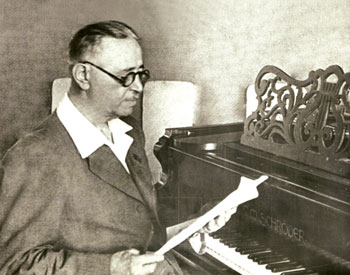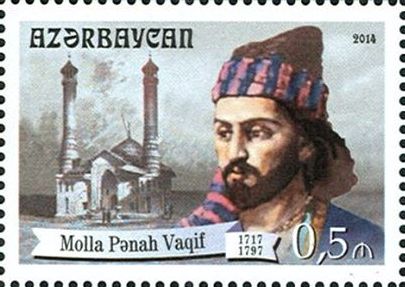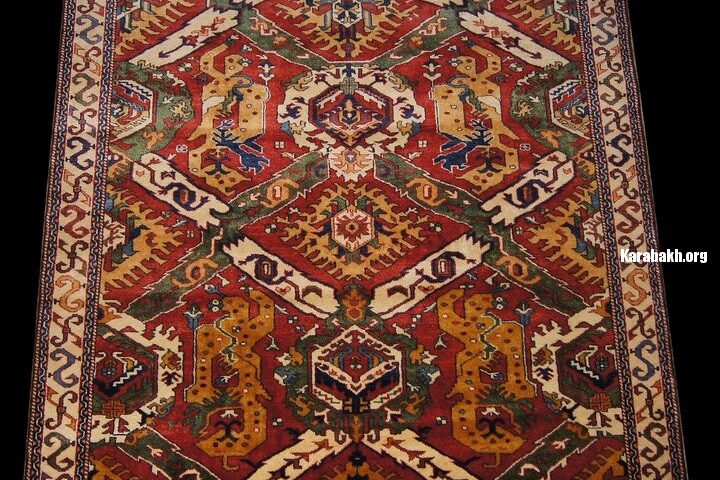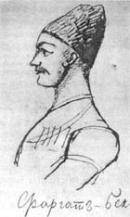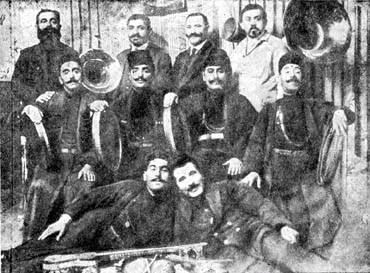Those, who created the musical heritage of Azerbaijan and won the «Conservatoire of the Caucasus» title for Karabakh.
Uzeyir bey Hajibeyov (1885-1948)
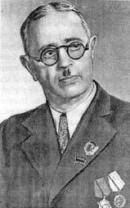
Abdulhusein bey of Shusha sent her pregnant wife Shirin khanim to Aghjabedi in Lowland Karabakh. Soon, when she returned back to Shusha, she was not alone. In Aghjabedi she gave birth to the fourth child in the family, -Uzeyir. Who knew then, that after many years Shusha and Aghjabedi people would argue with each other when remembering this story: «Uzeyir was from Aghjabedi» – «Nothing of the kind. He was native of Shusha!..»
In any case, little Uzeyir was from Karabakh which gave Azerbaijan many talents.Uzeyir Hajibeyov became the pride of the Azeri nation and one of the greatest composers.
On January 12, 1908 the premiere of his opera «Leyli and Majnun» took place. This day gave the birth to the new opera genre in the Azeri music. Thus, Azerbaijan became the first Moslem nation in the world to have national opera. Enormous success inspired Hajibeyov to go further and write the operas «Rustam and Sohrab», «Sheikh Sanan», «Asli and Kerem» (it talked about the love of an Armenian girl Asli and Azeri man Kerem), «Shah Abbas and Khurshid Banu», first musicals «Husband and Wife», «Meshadi Ibad», «Arshin mal alan» etc., which became the immortal classics of the Azeri music. The musical comedy «Arshin mal alan» achieved world-wide glory and was translated into many languages.
In 1932-1937 Hajibeyov wrote his masterpiece -the «Koroglu» opera. This opera is considered to be the greatest ever in Azerbaijan.
Uzeyir Hajibeyov was also a talented playwright who wrote librettos to many of his operas and musicals. He left after himself a strong school of talented composers and musicians and by rights is considered to be the father of the Azeri classical music.
Hajibeyov is also the composer of the Azerbaijan national anthem, which he composed during the years of the Azerbaijan Democratic Republic (1918-1920).
Niyazi (1912-1984)
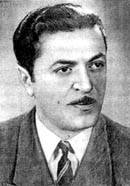
Niyazi was one of the greatest conductors in the history of the Azerbaijan classical music. He was Soltan Hajibeyov’s (Uzeyir Hajibeyov’s brother, also a famous composer) son. Having conducted in the symphonic orchestras in Prague, Berlin, Budapest, Bucharest, New York, Paris, Istanbul, London, Tehran, Beijing etc. Maestro Niyazi glorified the Azeri classical music all over the world. He enraptured the listeners with his endless energy, high artistic performance and musical talent of a great conductor.
Famous American writer Philip Bonosky said: «To me, Niyazi is one of the most prominent conductors in the world».
Famous Italian conductor Carlo Chekki noted: «Art of Niyazi deserves the highest appraisal. He has extraordinary hands, great will and strong character».
Niyazi was not only a great conductor, but also a talented composer. His compositions always distinguished with splendid synthesis of the national coloring and methods of the classical symphonic music. The symphonic mugham «Rast» composed by Niyazi is also a great success in applying the Azeri musical folklore to the symphony genre and to the classical music in general. The symphonic mugham «Rast» was included to the repertoire of many symphonic orchestras around the world.
Maestro Niyazi also headed the Azerbaijan symphonic orchestra for 46 years, from 1938 to the end of his life.
Bul-Bul (1897-1961)
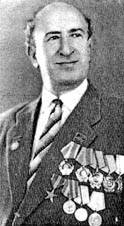
One of the best representatives of the Azeri vocal arts Bul-bul (real name is Murtuza Mammadov) was born in Shusha in 1897. Since his childhood he was fascinated with the beauty of his native Karabakh, which inspired him throughout all his life, listened famous Karabakh singers and learned from them. Soon he himself became an adornment of the local Karabakh festive companies. These little folk companies gave little Murtuz the first musical education. For his beautiful voice people called him Bul-Bul – nightingale. Bul-bul performed the old Azeri folk songs with great inspiration and love. No one could so skillfully sing the folk songs «Susen sunbul», «Yakhan duymele», «Qalada yatmish idim», «Segah tesnifleri» and many others as did Bul-bul.
Bul-bul was also a great opera vocalist, who had an excellent musical education having graduated from the Azerbaijan State Conservatoire and famous Italian «La Skala». He was first to play the role of Koroglu in the opera of the same name by U. Hajibeyov and created an immortal image of the Azeri legendary hero. U. Hajibeyov repeatedly used to say that he counted mainly on Bul-bul, when writing the «Koroglu» opera.
Above all, Bul-bul was a pedagogue, who brought up a whole generation of young talented vocalists. He was also a scientist whom belongs a number of works dedicated to the Azeri music.
Abdulbagi Zulalov (1841-1927)
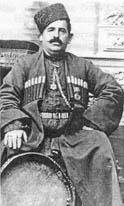
Abdulbagi (also widely known as Bulbuljan) was born in 1841 in Shusha and became one of the brightest and beloved mugham singers in the whole Caucasus (mugham -an original improvisational classical folk music popular in Azerbaijan). Among all the popular mugham singers we can find a few ones who deserves to be compared with Abdulbagi. He had both wonderful voice, attractive appearance and high stage culture. He was «the ruler of the hearts» – the title he preserved all his life.
In 1875 Abdulbagi moved to Tiflis (XIX c. Name for Tbilisi), which was the most fabulous city of the Caucasus at that time. In Tiflis he began to perform mugham with great tarist Sadikhjan, who was also from Karabakh. Soon their names became popular not only in Tiflis, but in the whole Georgia. IN a short period of time Abdulbagi learned perfect Georgian language and began to perform the Azeri mughams in Georgian, which brings the Georgian listeners into rapture.
Abdulbagi was also a teacher, who had very talented disciples. Such masters of mugham as Jabbar Karyaghdy, Musa Shushinsky, Meshedi Mamed Farzaliyev, Alesker of Sheki, Seyid Shushinsky and many others learned a lot from him. No wonder that the Zulalov’s family is also known in Azerbaijan, as the family of musical talents. Abdulbagi’s daughter, granddaughter and nephews: respectively Aziza khanim, Sona khanim, Ali and Gambar continued his traditions with dignity.
Great singer Abdulbagi died in 1927 in Baku.
Jabbar Karyaghdy (1861-1944)
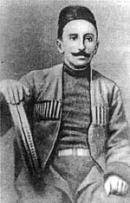
One of the greatest Azeri folk music singers Karyaghdy has outstanding deserts in improving mugham. He brought a new spirit, new shape and content to mugham. Another famous singer Seyid Shushinsky, who was also his disciple, compared Karyaghdy’s voice with a powerful torrent from the mountains, carrying away everything on its way.
In 1910-1915, by invitation of the firms «Sport-Record» and «Gramophone», Karyaghdy with famous Karabakh tarist Kurban Primov and kemanchist Sasha Oganezashvili (tar and kemancha -Azeri folk musical instruments) goes to Warsaw, Riga and Kyiv and records his voice. These records were preserved till now.
Karyaghdy is one of the founders of the Azerbaijan State Conservatoire, who also taught there for a long time. He is the father of a new musical school in Azerbaijan. Famous singers and musicians Bul-bul, Seyid Shushinsky, Kurban Primov, Sasha Oganezashvili, Zulfugar Adigezalov and many others are the followers of the Karyaghdy school.
Bul-bul wrote these words about his beloved teacher: «Jabbar Karyaghdy has no equals. The range of his voice is two and a half octaves. Jabbar’s voice is stronger than that of Karuzo. He can sing mugham for 2-3 hours. He created first the Azeri style of performance of the songs.»
Seyid Shushinski (1889-1965)
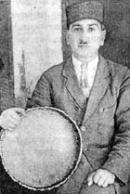
A prominent Azeri singer with a wonderful voice, Seyid Shushinski was born in 1889 in the village of Horadiz in Karabakh. His interest in the folk music and mugham was revealed from his childhood. He got his first musical education in Navvab’s musical school in Shusha. Soon Seyid became popular and beloved among the people, as any mugham and song in his performance gave the listeners a great artistic pleasure.
Seyid Shushinski had an excellent musical memory and great artistic performance talent. He brought many new elements, shapes to mughams and have done a invaluable work towards enrichment of the art of mugham.
Great Azerbaijanian composer Fikret Amirov said: «If Jabbar Karyaghdy was the brain of the Azeri music, then Seyid Shushinski was the beating heart of this music..». People called Seyid the singer of beauty, heart and spiritual freedom.
Seyid Shushinski served his people with honor all his life and by rights deserved the title of the national singer of Azerbaijan.
Khan Shushinski (1901-1979)

Another famous Karabakh singer Khan Shushinski became a truly beloved national singer of Azerbaijan. He continued the traditions of Jabbar Karyaghdy and raised them to a new level of high arts. He subdued the listeners with his rich and strong voice. We dare to say, that after Jabbar Karyaghdy and one of Khan’s teachers Seyid Shushinski, no one could so skillfully sing the rhythmic mughams, as did Khan. And of course, no one could so beautifully perform the «Karabakh Shikesteh» as did Khan.
He continued further the improvement of mugham, creating new forms of performance. Khan Shushinski is also the author of several folk-music-style songs. Among these songs are famous «Shushanin daghlary» (the mountains of Shusha), «Menden gen gezme», «Ay guzel» and others, which are beloved and performed among the people till now.
Khan Shushinsky’s concerts always were accompanied with great agitation. The queues for getting the tickets for his concerts sometimes were reached several hundred meters in length.
Khan Shushinski’s name became one of the brightest symbols of Karabakh, his voice singing the «Karabakh Shikesteh» became imprinted on the memory of the Azeri nation forever.
Sadikhjan / Mirza Sadikh Asad oglu (1846-1902)
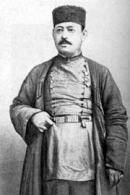
Sadikhjan born in Shusha became the greatest tarist ever. His name became inseparable from the popular and beloved musical instrument tar. Tar is a folk musical instrument with a graceful and sensitive voice, very popular in many countries from the Caucasus, to the Middle East and the Central Asia. One cannot imagine mugham without tar. But among all kinds of tars used by many peoples, the Azeri tar is notable for both its shape, advantage and perfection. And the creator of this tar was Sadikhjan.
In approximately 1870-1875 Sadikhjan totally renewed the Persian tar, which had small neck and five strings. He changed the shape of the neck, threw out unnecessary tones and brought the number of the strings from five to eleven. Besides, before Sadikhjan, people played tar holding it on their knees. Sadikhjan abolished this primitive manner and for the fist time presented the play on tar nestled to the breast.
All of these reforms expanded the performing capabilities of tar and made the mughams performed on this instrument sound brighter and more colorful. Soon these novelties introduced by Sadikhjan were accepted throughout the whole Caucasus and Central Asia. The new tar he created, the Azeri tar, ousted the primitive five-string Persian tar. The new instrument was named a «magical tar» and Sadikhjan became «the father of tar». And the Motherland of this most beloved national musical instrument was proudly the Karabakh region of Azerbaijan.
Grigor Bala oglu (1859-1929)
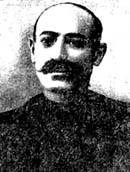
The Karabakh land brought up many talents, Armenians by nationality too. Many of them have greatly contributed to the development of the Azeri culture and by rights deserved the universal respect of people. One of such persons was a great tarist Bala oglu Grigor, an Armenian born in Shusha in 1859.
Grigor began his professional career by accompanying in tar the legendary Karabakh khanende Haji Husi (?-1888). Haji Husi, Grigor and a famous kemanchist Bagdagul oglu Ata, all are the Karabakh musicians, have toured a lot throughout the Caucasus, Iran and Russia. This trio was always on the top.
Grigor Bala oglu always took the first place in the musical competitions of that time. He also participated with great success in the first concerts of the Oriental music, which took place in Shusha (1901) and Baku (1902-1903).
After Haji Husi’s death Grigor accompanied other famous Azeri Karabakhi singers – Zabul Kasim, Abdulbagi, Meshadi Mamed Farzaliyev and Seyid Shushinsky.
Grigor Bala oglu was also a good teacher. His best disciple was his son Bala Grigor oglu Malikov, who worthily continued the traditions of his father.
Kurban Pirimov (1880-1965)
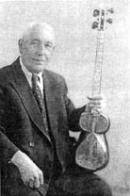
Kurban Pirimov, one of the most prominent disciples of the «father of tar» Sadikhjan was born in 1880 in the Karabakh village of Gulably. He became one of the greatest and most beloved tarists, who played an outstanding role in improvement of the Azeri music and its popularization inside and outside of the country.
The Karabakh trio of the singer (khanende) Jabbar Karyaghdy, kemanchist (Sasha Oganezashvili and tarist Kurban Pirimov was popular far away from the boundaries of Azerbaijan and the Caucasus.
Kurban Pirimov always remembered Karyaghdy and Oganezashvili with great respect and pride: «I am a happy man- he used to say- because, I played tar on the left of Jabbar and on the right of Sasha for twenty years».
But despite these modest words, he didn’t fall behind these great artists and occupied a worthy place in the history of the Azeri music. Everyone was enraptured by his performance, how he used to sit near the khanende (singer) and hold proudly his tar on his breast.
Kurban Pirimov became the knight of the national music. He and his tar became an adornment of the Azeri music for 70 years. Kurban Pirimov was 85, when he played tar on the stage for the last time. And his play was as beautiful, as when he was a 20 year old young, ardent, handsome man.
Source: F. Shushinsky, «Shusha» Baku 1998
